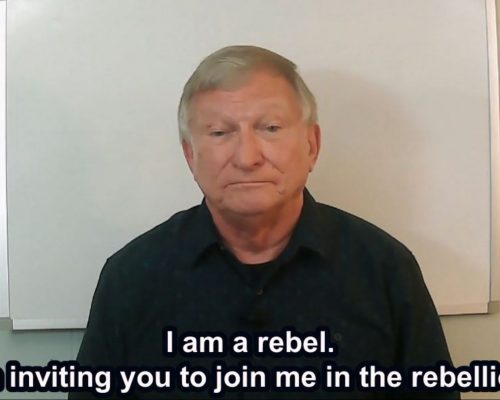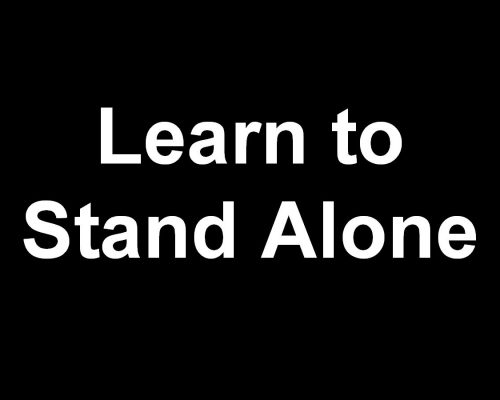Are You Teachable? Are You REALLY?
One of the most common phrases to come from the mouths of Christians (and most others too) is “I know I’ve got a lot to learn…” Or “Of course, I don’t know it all yet…” Or “There are so many others that know so much more than I do…” Or, “I’m certainly no expert, but…”
These are all politically correct things to say. They sound nice and humble. And we all know that we are supposed to stay humble. Those statements are also usually true!
But I’m convinced that for the most part we really don’t mean them. Oh, we think we mean them. But really, we don’t.
Let me offer you some thought-provoking questions. When was the last time you changed your thinking about something you previously thought was right but that you now believe to be wrong? Or reverse that… When was the last time you thought that something was in error that you now believe to be correct? When was the last time you actually changed a belief you held about something?
And while you’re thinking, let me suggest another. “What do you believe that makes you different from the people in the peer group that is most influential in your life?” (That could be fellow church members, fellow students, a Sunday School class, a group of pastors, etc.)
Please don’t misunderstand. I’m not suggesting that in order to prove our teachability that we have to make sure that we flip-flop our beliefs every few days.
What I am suggesting is that when a Christian is truly teachable and really growing in Christ, most likely God will be inexorably and relentlessly changing that Christian over time. Most growing Christians look back over the years and say, “Wow, God’s really changed me in lots of ways!” We may have awkward memories in which we took strong stands, about which, on further and more careful study of Scripture, we decided that we were very wrong!
But I’m afraid that many many people don’t even bother checking out what they believe. They just want to believe whatever the people who are important to them happen to believe. Instead of being courageously open to Scripture, they just want to fit in comfortably.
If something comes up that doesn’t fit their current belief system, they may ask, “What does my pastor say about this?” (Substitute your favorite spiritual, educational, or philosophical authority for pastor in that sentence.)
If someone else mentions a belief about a Scriptural issue that doesn’t quite fit the belief scheme of our group, we may think, “Oh, I don’t even want to think about that! I don’t want to go there! I don’t want to even consider anything that might mark me as different in some way from my peers!”
You know what I think God is really pleased with?
I think He is pleased when we make up our minds that we care more about what He says than what any other human being believes.
I think He is really pleased with us when we care enough about what He says that we really learn to study His Word very carefully. That means acquiring and learning to use some Bible study tools really well.
We should know how to do some word studies on Hebrew and Greek words. No, you don’t have to become a Hebrew and Greek scholar. It’s pretty easy to see where the same Greek and Hebrew words are used in other places in the Bible and to learn their basic meanings and nuances.
We should learn how to run lots of cross references on passages so that we can see what God says in other parts of the Bible about the issue at hand.
We should learn the difference between careful exegesis and careless eisegesis.
On controversial issues, we should learn how to carefully follow the arguments and the use of Scriptures by different people who have taken time to study the issue and who actually disagree with one another.
Often we are guilty of making up our mind what we want to believe about an issue (perhaps because that’s what the important people that we happen to know happen to believe), and then just try to find Scriptures to back us up. We may be very hesitant to read something that represents a serious study of an issue which comes to a conclusion different from the one we want to arrive at!
If we really believe that God’s Word is God’s Truth, then it makes sense that we would want to know what is there, whoever might happen to agree or disagree with us!
So how courageous are you? How disciplined are you? Are you courageous and disciplined enough to learn to study the Bible for yourself? Believe me, God loves it when you care enough about His Truth that you become a courageous, disciplined student of His Word!
Perhaps I’d better add one more caveat. I have focused on only one extreme here… the cowardly unteachable extreme. As usual there is another extreme… the reckless unteachable extreme. If you become courageous and disciplined, be very humble about your interpretations. Be wary about your own interpretations! Especially if they seem to be out of the mainstream of many other serious Bible students. You may be correct and other serious students incorrect. But if they are serious students, then they have reasons for what they believe.
Maybe a good response in those cases might be something like this: “Well, I have tried to study this issue carefully. And it seems that I find myself in a minority. I realize that I may be not seeing the whole picture yet. I may be thinking badly. But at this point, these are my convictions. So I’m going to stand on them. But I certainly want to stay humble and teachable. And I want to stay open to God leading me to see my blind spots!”
Stay genuinely teachable!
And stay in the battle!
Steve Hall
Related Posts:







-
Tagged disagreement, Romans